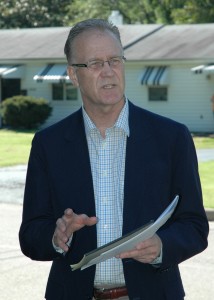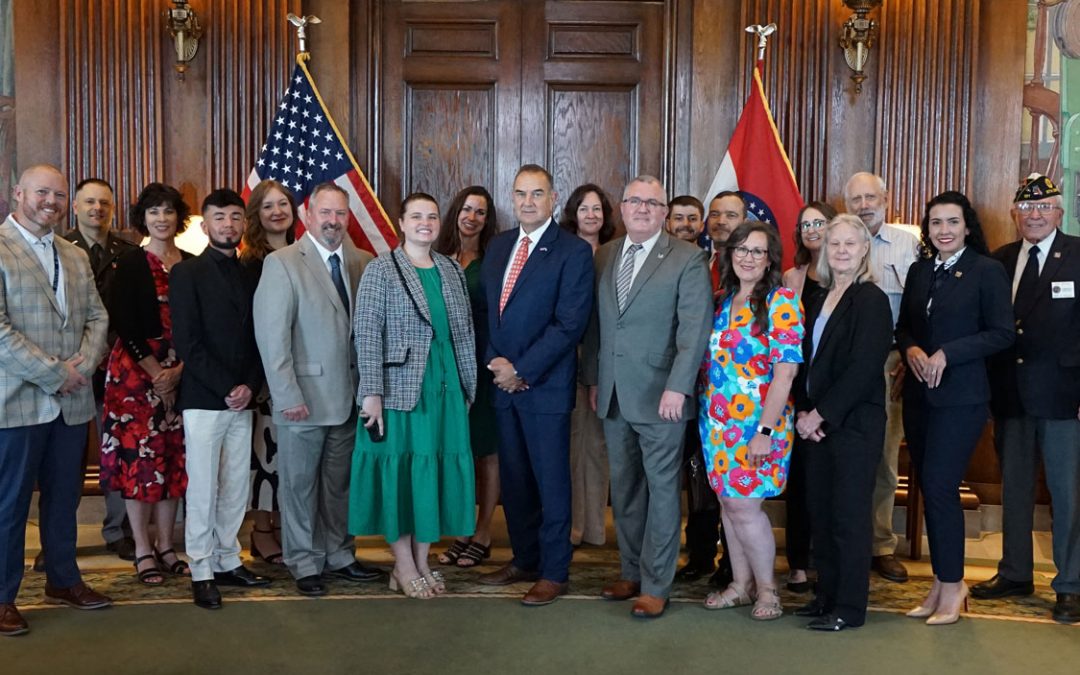
UMSL political scientist Todd Swanstrom speaks June 30 in Berkeley, Mo., about a report he co-wrote on foreclosures in Missouri.
Todd Swanstrom, the E. Desmond Lee Endowed Professor of Community Collaboration and Public Policy Administration at the University of Missouri–St. Louis, acknowledges that Missouri is not among the states hit hardest by the foreclosure crisis. That is no reason to sit back and watch the problem worsen, he said. Missouri might not feel the pain as much as California and elsewhere, but a new report co-written by Swanstrom shows home delinquencies and foreclosure rates in the Show-Me State are now four times higher than previous decades.
With Will Winter, research associate in the Public Policy Research Center at UMSL, Swanstrom wrote a white paper titled “Foreclosure in Missouri: Causes, Consequences and Solutions,” which summarized their findings from the Missouri Homeownership Preservation Summit held Jan. 14 in Jefferson City, Mo. The report, released June 30, shows that minority and urban core areas suffered the highest rates of foreclosure, but the problem has broadened beyond those borders.
“It started in the cities and spread to the suburbs and small towns,” Swanstrom said at a news conference in Berkeley, Mo., last week. “It’s not just an inner-city problem anymore. And it’s not going away anytime soon.”
The UMSL researchers point out in their report that Missouri’s increased foreclosure rate was initially driven by the boom in subprime mortgages with exotic, unsustainable mortgage terms. Unemployment is making matters worse. The report states that a task force is urgently needed to gather facts and make recommendations to the governor and elected officials.
“The research is clear,” Swanstrom said. “Foreclosures impose huge costs on Missouri’s families, communities and local governments.
“The state of Missouri needs to take action now,” he said.
Among the report’s recommendations are that the state lengthen the foreclosure process, strengthen mortgage broker regulation, toughen regulation of high-cost loans, increase resources for foreclosure counseling and appoint a “Missouri Homeownership Preservation Task Force.”
Foreclosures place huge financial costs on families and communities. The Center for Responsible Lending estimates that Missourians lost more than $1.5 billion in property values in 2009 due to adjacent foreclosures, and the additional foreclosures expected through 2012 will create an additional loss of $5.8 billion.
Local governments incur extra costs for maintenance of vacant properties and increased crime, estimated to average $19,227 per foreclosure, according to the Joint Economic Committee of the U.S. Congress. They also lose revenue due to reduced or deferred property tax payments, the UMSL researchers said.
The negative effects of foreclosure on families and children are also detailed in the report. The tremendous costs that foreclosures impose on families and communities are cited as incentives for governments, nonprofits and community leaders to act now to keep families in their homes.
“Families throughout the region continue to be in jeopardy of losing their homes at a disturbing all-time high,” said Chris Krehmeyer, president and CEO of Beyond Housing, who was also at the news conference. “Although this problem has been with us for several years, it continues to wreak havoc on families and communities in the region, and we need to remain vigilant in providing services to those in need.”
Swanstrom and Winter’s full report can be viewed at the Public Policy Research Center website, http://www.pprc.umsl.edu.
More information:
http://www.umsl.edu/~polisci/faculty/profiles.html#silva
http://pprc.umsl.edu/base_pages/home/staff.htm#research
http://bit.ly/blWpZ1














